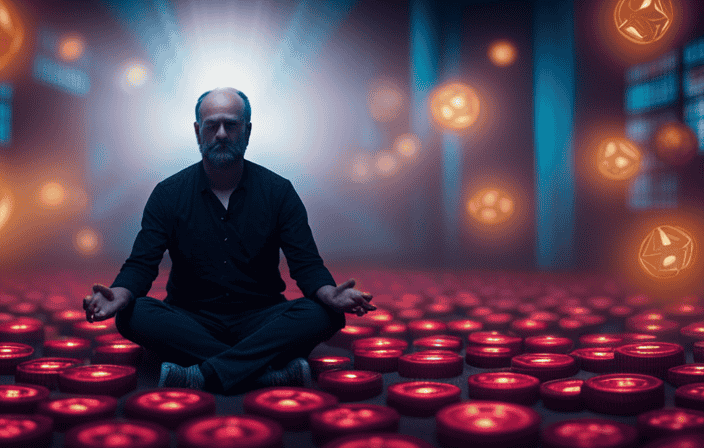Some might view spiritual psychosis simply as intense religious zeal or odd behavior, yet it’s crucial to acknowledge the significant effect it can wield on people’s lives.
Spiritual psychosis is a mental condition characterized by delusions, hallucinations, and bizarre behaviors, often influenced by spirituality or religion.
This article aims to shed light on this often misunderstood condition, exploring its symptoms, causes, and treatment options.
By understanding and addressing spiritual psychosis, we can provide support and enhance the mental health and well-being of those affected.
Key Takeaways
- Spiritual psychosis is a mental condition influenced by spirituality or religion, characterized by delusional beliefs, hallucinations, and bizarre behaviors.
- Symptoms of spiritual psychosis include delusions of grandeur, persecution, or reference, as well as hallucinations, disorganized thinking, and behavior.
- Causes of spiritual psychosis can be attributed to religious or spiritual beliefs, substance abuse or withdrawal, genetics, brain chemistry, and environmental stressors.
- Treatment for spiritual psychosis involves a combination of medications, therapy, support groups, and self-care techniques to manage symptoms and improve overall mental health and well-being.
Definition and Symptoms
I know that spiritual psychosis is a mental condition influenced by spirituality or religion. It involves delusional beliefs, hallucinations, and bizarre behaviors. Symptoms of spiritual psychosis can include delusions of grandeur, persecution, or reference. Hallucinations, disorganized thinking, and behavior are also common.
Religious influences play a significant role in shaping an individual’s perception of reality and mental state. These beliefs can lead to distorted perceptions and false beliefs about identity and purpose.
The impact of spiritual psychosis on daily life can be profound. It can cause distress, impairment in daily functioning, withdrawal from society, anxiety, and strained relationships. Individuals experiencing spiritual psychosis may feel touched by supernatural entities, undergo extreme changes in religious devotion, believe in paranormal events, or feel they possess special powers.
Early intervention and appropriate treatment are crucial to managing the symptoms and improving overall well-being.
Causes and Triggers
Religious and spiritual beliefs can act as catalysts, igniting the flames of altered perception and detachment from reality, leading individuals down the winding path towards spiritual psychosis. These beliefs have the power to shape one’s reality and influence their mental state. Moreover, neurotransmitter imbalances play a significant role in the development of spiritual psychosis. Genetic factors can contribute to susceptibility, while imbalances in brain chemistry can lead to sensory overload and hallucinations.
The table below provides a summary of the causes and triggers of spiritual psychosis:
| Causes | Triggers |
|---|---|
| Religious beliefs | Substance abuse/withdrawal |
| Spiritual practices | Trauma |
| Genetic factors | Environmental stressors |
| Brain chemistry |
It is important to recognize the potential impact of religious influences on mental health. Understanding the role of neurotransmitter imbalances can shed light on the complex nature of spiritual psychosis and guide treatment approaches. By addressing these underlying causes and triggers, individuals can receive the appropriate support and interventions to navigate their unique experiences and improve their overall well-being.
Delusions and Hallucinations
Recognizing the impact of distorted perceptions and sensory experiences is crucial in understanding the complexities of spiritual psychosis. When it comes to understanding the mind of someone experiencing spiritual psychosis, it is important to consider the types of hallucinations they may be experiencing and how it affects their daily life.
Hallucinations in spiritual psychosis can take various forms, such as visions of deities or hearing divine voices. These sensory perceptions are not based on external stimuli but are instead internally generated. These hallucinations can significantly impact an individual’s daily life, causing confusion, distress, and impairing their ability to function effectively.
Individuals experiencing spiritual psychosis may struggle with differentiating between what is real and what is hallucinatory. This can lead to difficulties in maintaining relationships, holding down jobs, and participating in everyday activities. Understanding the specific types of hallucinations that individuals with spiritual psychosis experience can help mental health professionals develop targeted treatment plans to address their unique needs.
Treatment Options
Medications, therapy, and support groups are effective options for managing and alleviating the symptoms of spiritual psychosis. Antipsychotic drugs are commonly prescribed to provide symptom relief, but it is important to combine medication with therapy and counseling to develop healthy coping mechanisms. Talk therapy, alternative therapies, group therapy, and family therapy can all be beneficial in treating spiritual psychosis. Additionally, peer-led support groups offer guidance and support, allowing individuals to share their experiences and develop coping strategies together. It is important to note that alternative therapies, such as mindfulness and meditation, can also play a role in managing symptoms and promoting overall well-being. By incorporating these treatment options, individuals with spiritual psychosis can find support and develop effective strategies for managing their condition.
| Treatment Options |
|---|
| Medications |
| Therapy |
| Support Groups |
Coping and Self-Care
I find it helpful to engage in mindfulness and meditation practices to cope with spiritual psychosis and promote my overall well-being.
Mindfulness practices allow me to focus on the present moment and observe my thoughts and emotions without judgment. This helps me become more aware of any delusions or hallucinations that may arise and allows me to respond to them in a more balanced and grounded way.
Additionally, seeking social support has been crucial in my journey of coping with spiritual psychosis. Connecting with others who have similar experiences or who are understanding and supportive has provided me with a sense of validation and comfort. It has also allowed me to learn from their coping strategies and gain new perspectives on my own condition.
Importance of Seeking Help
Seeking professional help from a qualified mental health professional is essential for effectively managing spiritual psychosis. Studies have shown that early intervention and appropriate treatment can significantly improve long-term outcomes.
It is important to address the stigma surrounding spiritual psychosis and seek support from religious or spiritual communities.
Engaging in therapy with a mental health professional can provide valuable guidance and support in navigating the challenges associated with spiritual psychosis. They can help individuals develop healthy coping mechanisms and strategies to manage symptoms.
Additionally, medication management may be considered if prescribed by a healthcare provider.
Combining professional help with self-help techniques, such as mindfulness and meditation, can further enhance overall mental health and well-being.
By seeking help, individuals can gain a better understanding of their experiences and work towards managing symptoms effectively.
Facts and Awareness
By educating oneself and others about the facts and awareness surrounding spiritual psychosis, individuals can challenge misconceptions and promote understanding within their communities.
It is important to recognize that spiritual psychosis is not limited to any specific faith or belief system. People from various cultural backgrounds can experience spiritual psychosis, and their cultural beliefs may influence the manifestation of symptoms. Understanding the impact of cultural beliefs on spiritual psychosis is crucial in providing appropriate support and treatment.
Additionally, incorporating spirituality into mental health care can be beneficial for individuals experiencing spiritual psychosis. Acknowledging and respecting the role of spirituality in one’s mental health journey can help individuals find meaning and purpose, leading to better overall well-being.
By fostering an environment that values and acknowledges spirituality in mental health, we can promote inclusivity and support for individuals experiencing spiritual psychosis.
Frequently Asked Questions
How common is spiritual psychosis?
Spiritual psychosis is relatively uncommon, affecting a small percentage of the population. However, it can occur in individuals of any faith or belief system. Its causes include altered perception due to religious or spiritual beliefs, substance abuse, genetics, and environmental stressors. Symptoms include delusions, hallucinations, and disorganized thinking/behavior.
Can spiritual psychosis be cured completely?
Spiritual psychosis cannot be completely cured, but treatment options such as therapy and medication can help manage symptoms and improve overall well-being. However, the long-term effects of spiritual psychosis can vary and may include ongoing distress and impaired daily functioning.
Are there any alternative treatments available for spiritual psychosis?
There are alternative therapies and holistic approaches available for spiritual psychosis. These can include practices such as art therapy, music therapy, mindfulness, yoga, and acupuncture. These approaches aim to address the individual’s mental, emotional, and spiritual well-being.
Can spiritual psychosis be prevented?
Preventing spiritual psychosis involves early intervention. Recognizing and addressing early signs and symptoms, such as extreme changes in religious devotion or belief in paranormal events, can help prevent distress and impairment in daily functioning.
Are there any support groups specifically for individuals with spiritual psychosis?
Yes, there are support groups specifically for individuals with spiritual psychosis. These groups offer benefits such as guidance, support, and the opportunity to share experiences and develop coping strategies to manage symptoms and improve overall well-being.
Conclusion
In conclusion, spiritual psychosis is a fascinating condition that offers a unique perspective on the human mind and its connection to spirituality. Delusions and hallucinations may seem bizarre, but they provide a window into the depth of our beliefs and experiences.
While treatment options exist, it’s important to recognize the value of these spiritual journeys. So, let us embrace the supernatural, for it is through understanding and acceptance that we can navigate the complexities of our minds and find solace in the unknown.
Seek help when needed, but never forget the power of the spiritual realm within us all.









